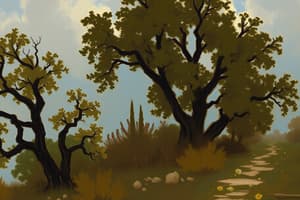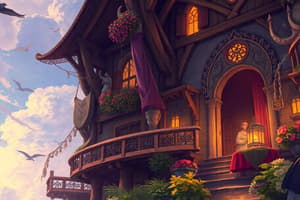Podcast
Questions and Answers
What is a 'Character'?
What is a 'Character'?
- The main idea of a story
- A turning point in a narrative
- People or animals involved in a story (correct)
- The time and place of the action
What does 'Setting' refer to?
What does 'Setting' refer to?
Time and place of the action
What is a 'Protagonist'?
What is a 'Protagonist'?
Main character
Define 'Antagonist'.
Define 'Antagonist'.
What is 'Irony'?
What is 'Irony'?
What is 'Plot'?
What is 'Plot'?
What does 'Situational Irony' mean?
What does 'Situational Irony' mean?
Define 'Conflict'.
Define 'Conflict'.
What is 'Theme'?
What is 'Theme'?
What is meant by 'Imagery'?
What is meant by 'Imagery'?
Define 'Flashback'.
Define 'Flashback'.
What does 'Foreshadowing' involve?
What does 'Foreshadowing' involve?
What is 'Alliteration'?
What is 'Alliteration'?
Define 'Simile'.
Define 'Simile'.
What is the 'Climax' of a story?
What is the 'Climax' of a story?
What is a 'Metaphor'?
What is a 'Metaphor'?
Define 'Personification'.
Define 'Personification'.
What is 'Internal Conflict'?
What is 'Internal Conflict'?
What does 'External Conflict' mean?
What does 'External Conflict' mean?
Define 'Characterization'.
Define 'Characterization'.
What is 'Verbal Irony'?
What is 'Verbal Irony'?
Define 'Formal Writing'.
Define 'Formal Writing'.
What is 'Informal Writing'?
What is 'Informal Writing'?
Flashcards are hidden until you start studying
Study Notes
Literary Terms Overview
- Character: Individuals (people or animals) involved in a narrative, contributing to the story's development.
- Setting: The time and place where the story's action occurs, establishing the context for events.
Key Roles in a Story
- Protagonist: The main character around whom the story revolves; often faces challenges and conflicts.
- Antagonist: The character or force that opposes the protagonist, introducing conflict and tension.
Plot Elements
- Plot: The sequence of actions and events that make up the story, driving the narrative forward.
- Climax: The critical turning point in the story where conflict reaches its peak, leading to the resolution.
Conflicts in Literature
- Conflict: The problem or struggle that characters must resolve, central to the plot.
- Internal Conflict: A struggle occurring within a character's mind, often relating to emotions or decisions.
- External Conflict: A struggle between a character and an outside force, such as another character or societal expectations.
Literary Devices
- Irony: A literary technique where the outcome is contrary to what is expected; can encompass various forms, such as:
- Situational Irony: When a character's actions lead to an outcome that is the opposite of what was intended.
- Verbal Irony: A discrepancy between what is said and what is meant, often used for humor or emphasis.
- Imagery: The use of descriptive language that creates visual representations in the reader's mind, enhancing the narrative.
- Flashback: A narrative device that interrupts the chronological flow to revisit past events, providing background or context.
- Foreshadowing: Clues or hints that suggest events that will occur later in the story, building anticipation.
Figurative Language
- Alliteration: The repetition of initial consonant sounds in closely positioned words, often used to create rhythm or emphasis.
- Simile: A comparison between two different things using "like" or "as," highlighting similarities.
- Metaphor: A direct comparison where one thing is said to be another, enhancing meaning through symbolic representation.
- Personification: Attributing human qualities to non-human entities, making them relatable to the reader.
Writing Styles
- Formal Writing: Characterized by complex sentence structures and a technical vocabulary, suitable for academic and professional contexts.
- Informal Writing: Utilizes simple sentences and everyday language, creating a conversational tone, similar to speaking with friends.
Themes in Literature
- Theme: The central idea or underlying message of a literary work, providing insight or commentary on life or society.
Character Development
- Characterization: Techniques employed by authors to develop and convey the personality and traits of characters, enriching the reader's understanding of their roles within the story.
Studying That Suits You
Use AI to generate personalized quizzes and flashcards to suit your learning preferences.




